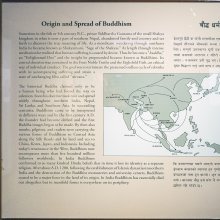Hala, Hālā, Hāla, Halā: 33 definitions
Introduction:
Hala means something in Hinduism, Sanskrit, Jainism, Prakrit, Buddhism, Pali, the history of ancient India, Marathi, Hindi, biology. If you want to know the exact meaning, history, etymology or English translation of this term then check out the descriptions on this page. Add your comment or reference to a book if you want to contribute to this summary article.
Hala has 33 English definitions available.
Alternative spellings of this word include Haal.
Images (photo gallery)
Languages of India and abroad
Sanskrit dictionary
[Deutsch Wörterbuch]
Source: Cologne Digital Sanskrit Dictionaries: Böhtlingk and Roth Grosses Petersburger WörterbuchHala (हल):—[Pāṇini’s acht Bücher 3, 1, 140.]
1) m. n. gaṇa ardharcādi zu [Pāṇini’s acht Bücher 2, 4, 31.] Pflug (auch als Waffe) [Amarakoṣa 2, 9, 13.] [Hemacandra’s Abhidhānacintāmaṇi 225. 891.] [Halāyudha 2, 420. 5, 46.] [Mahābhārata 3, 809] (m.). halasya voḍhā [12724. 13, 3599. 3, 15297.] [Harivaṃśa 5035. 6784.] [Rāmāyaṇa 1, 40, 19.] baladevo halapāṇiḥ [Varāhamihira’s Bṛhajjātaka S. 58, 36. 69, 17. 70, 2. 86, 46.] [Hemacandra] [Yogaśāstra 3, 108.] [Chandomañjarī 42.] [Bhāgavatapurāṇa 10, 68, 40.] halābhiyoga [GOBH. 4, 4, 21.] hati [Gītagovinda 1, 12.] halasyeṣā [Scholiast] zu [Kātyāyana’s Śrautasūtrāṇi 22, 3, 48.] haleṣā [ANUPADAS. 5, 2.] mukha [Rāmāyaṇa 5, 19, 4. 7, 17, 37.] kakud [Bhāgavatapurāṇa 5, 25, 7.] daṇḍa und vaṃśa Deichsel eines Pfluges [Vyutpatti oder Mahāvyutpatti 133.] sīra [DIVYĀVADĀNA 50.] paṅktidāna [Oxforder Handschriften 35,a,38.] besteht aus acht Theilen: īṣā, yuga, sthāṇu, niryola, pāśikā, aḍḍacalla, caula und paccanī [KṚṢIS. 9, 6. 7.] halamaṣṭagavaṃ dharmyam [8, 3.] daśagava, pañcagava [5.] —
2) m. Nomen proprium a) pl. eines Volkes und Landes im Norden [Varāhamihira’s Bṛhajjātaka S. 14, 22. 27. 16, 6. 32, 19.] [TĀRAN. 171] (hali [WASSILJEW 53]). — b) eines Autors [Weber’s Verzeichniss No. 166.] —
3) f. ī Methonica superba (vgl. halinī und lāṅgalikī) [Rājanirghaṇṭa 4, 130.] — f. halā s. bes. —
4) n. a) Bez. einer best. zu den Ākṛtiyoga gezählten Constellation [Varāhamihira’s Bṛhajjātaka 12, 4. 13.] — b) = vairūpya deformitas (zur Erklärung des Namens ahalyā) [Rāmāyaṇa 7, 30, 22.] = pratiṣedha und vivāda (zur Erklärung von āryahala) [ŚĀKAṬĀYANA] in [Oxforder Handschriften 162,b, Nalopākhyāna 5.] — Vgl. ārya, bṛhaddhala, vella, su, hāla und hālika .
--- OR ---
Halā (हला):—1. indecl. Anruf an eine Freundin im Drama [Amarakoṣa 1, 1, 7, 15.] [Hemacandra’s Abhidhānacintāmaṇi 334.] [DAŚAR. 2, 65.] [Sāhityadarpana 172, 13.]
--- OR ---
Halā (हला):—2. f. die Erde; Wasser; ein berauschendes Getränk [ANEKĀRTHAK. im Śabdakalpadruma]
--- OR ---
Hāla (हाल):—= hala [Pāṇini’s acht Bücher 3, 1, 140.]
1) m. a) = hala Pflug [Medinīkoṣa l. 56.] — b) Beiname α) Balarāma’s, des Pflugträgers, [Trikāṇḍaśeṣa 1, 1, 36.] — β) Sātavāhana’s [Hemacandra’s Abhidhānacintāmaṇi 712.] [Anekārthasaṃgraha 2, 516] (sīta gedr.). bhūbhuj [Oxforder Handschriften 195,b,16.] — c) Nomen proprium eines Fürsten, Sohnes des Ariṣṭakarman [Viṣṇupurāṇa 4, 24, 12]; vgl. hāleya . —
2) f. ā Branntwein [Amarakoṣa 2, 10, 39.] [Hemacandra’s Abhidhānacintāmaṇi 903.] [Hemacandra’s Anekārthasaṃgraha] [Medinīkoṣa] [Halāyudha 2, 174.] [Hārāvalī 63.] [Meghadūta 50.] [Śiśupālavadha 10, 21.] [Spr. (II) 2992.] [Hemacandra] [Yogaśāstra 3, 15] (pl.). —
3) f. ī der Frau jüngere Schwester [Hemacandra’s Abhidhānacintāmaṇi 555.]
Sanskrit, also spelled संस्कृतम् (saṃskṛtam), is an ancient language of India commonly seen as the grandmother of the Indo-European language family (even English!). Closely allied with Prakrit and Pali, Sanskrit is more exhaustive in both grammar and terms and has the most extensive collection of literature in the world, greatly surpassing its sister-languages Greek and Latin.
See also (Relevant definitions)
Starts with (+323): Hala Apada, Hala huliga, Hala-kalita, Hala-na-cala, Halaabadi, Halaamala, Halaapada, Halaapeshta, Halaayi, Halaayudh, Halaba, Halabajara, Halabala, Halabalaga, Halabalage, Halabalagi, Halabalendi, Halabalige, Halabandha, Halabandya.
Ends with (+2375): Abahala, Abdhiphala, Abhala, Abhamgaviththala, Abhedyasthala, Abhishekashala, Abhishtaphala, Acashala, Acchadanaphala, Acchala, Achala, Achalachala, Achyutasthala, Acyutaphala, Acyutasthala, Adabahala, Adathala, Adattaphala, Addachala, Adhahsthala.
Full-text (+294): Halam, Halabhrit, Halahati, Halika, Halayudha, Haladhara, Halabhriti, Halahala, Halya, Hali, Aryahalam, Hala Apada, Halabandha, Haladanda, Halamukha, Bhuvanapala, Sira, Upahalaka, Halabajara, Halamukhi.
Relevant text
Search found 45 books and stories containing Hala, Haalaa, Hālā, Hāla, Halā, Haḷa, Haḷā, Hāḷa, Haḻa; (plurals include: Halas, Haalaas, Hālās, Hālas, Halās, Haḷas, Haḷās, Hāḷas, Haḻas). You can also click to the full overview containing English textual excerpts. Below are direct links for the most relevant articles:
Impact of Vedic Culture on Society (by Kaushik Acharya)
Samucitameya (Land Measures) < [Chapter 5]
Mingling of Cultures (K): The Gurjara Pratihāras < [Chapter 4]
Sanskrit Inscriptions (G): The Cālukyas < [Chapter 3]
Garga Samhita (English) (by Danavir Goswami)
Verses 5.24.15-16 < [Chapter 24 - The Killing of the Kola Demon]
Verse 8.13.4b < [Chapter 13 - A Thousand Names of Lord Balarāma]
Verse 1.10.38 < [Chapter 10 - Description of the Birth of Lord Balarāma]
Historical Elements in the Matsya Purana (by Chaitali Kadia)
Lineages of Vasiṣṭha < [Chapter 6 - Human history in the Matsya-Purāṇa]
Dynasty of Āndhra < [Chapter 6 - Human history in the Matsya-Purāṇa]
Self-Knowledge in Krishnamurti’s Philosophy (by Merry Halam)
Daśāvatāra-stotram (by Jayadeva Gosvami)
Guhyagarbha Tantra (with Commentary) (by Gyurme Dorje)
Text 15.10 (Commentary) < [Chapter 15 (Text and Commentary)]
Text 21.3 (Commentary) < [Chapter 21 (Text And Commentary)]
Chapter 21 - Eulogy to the Wrathful Deities < [Chapter 21 (Text And Commentary)]

